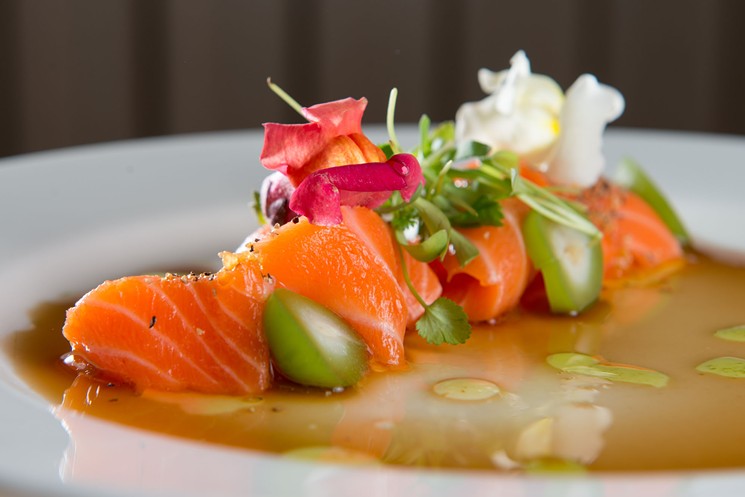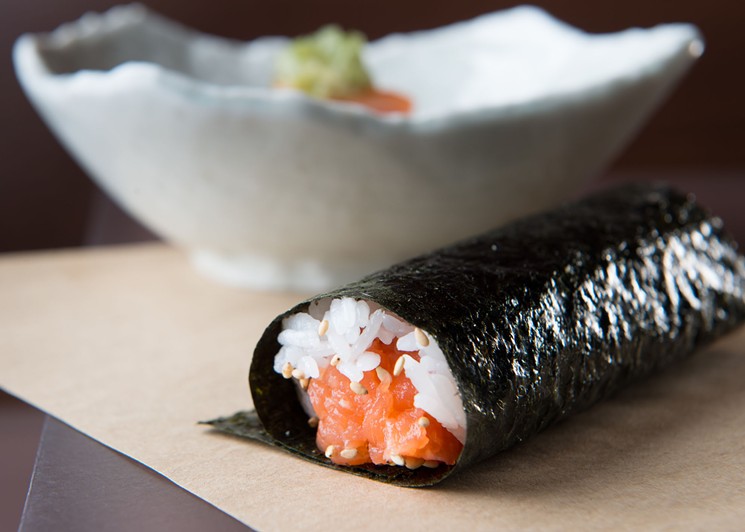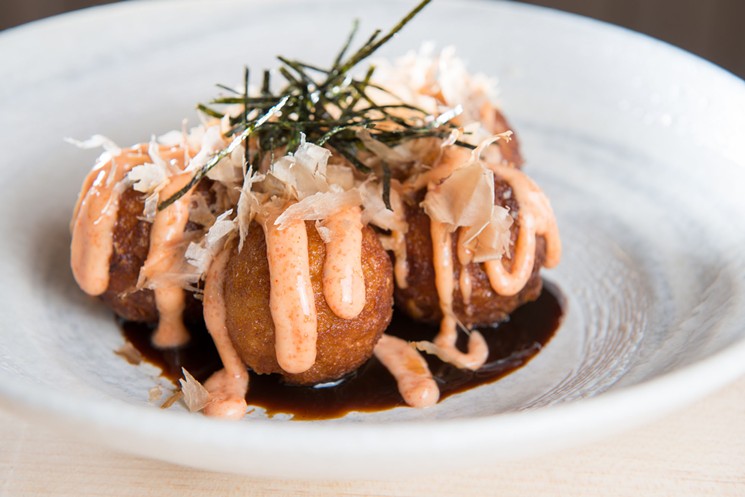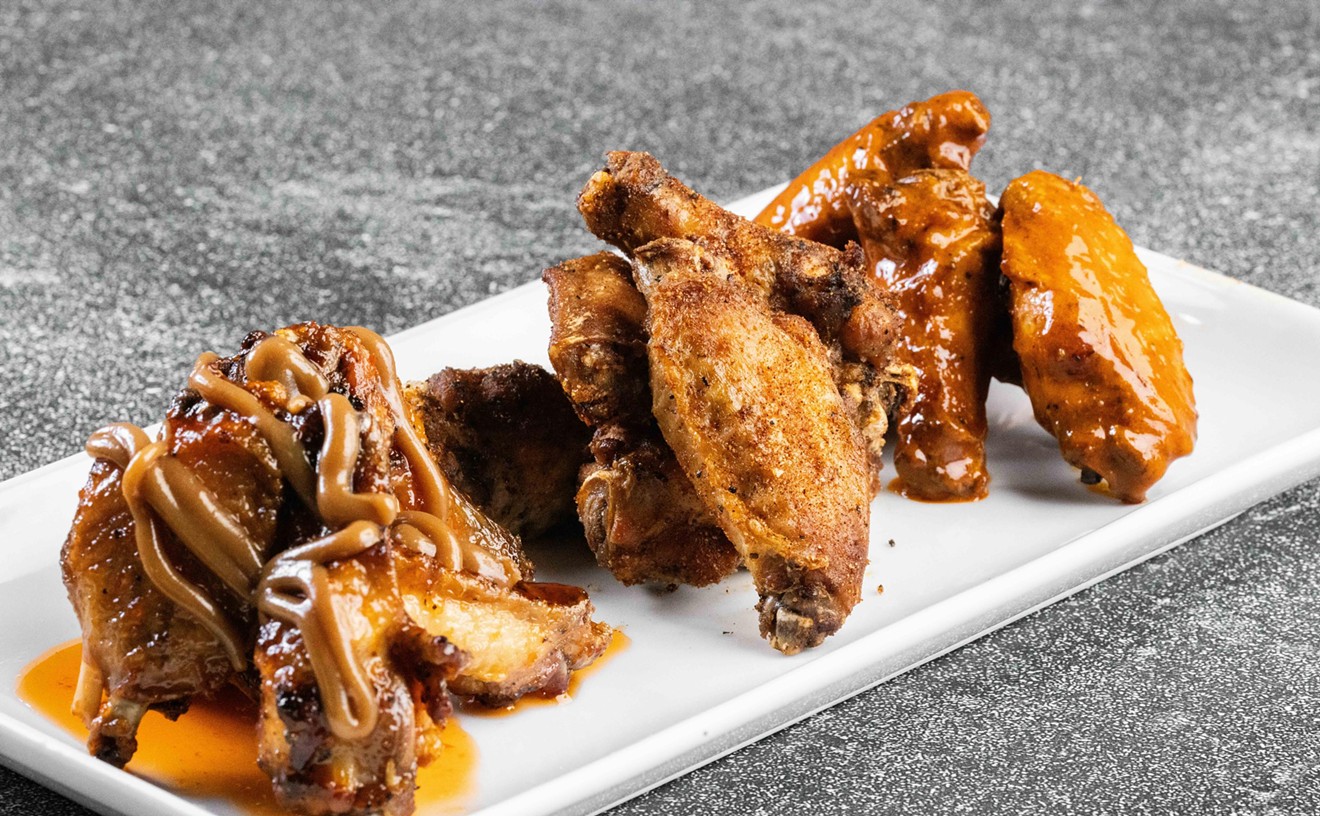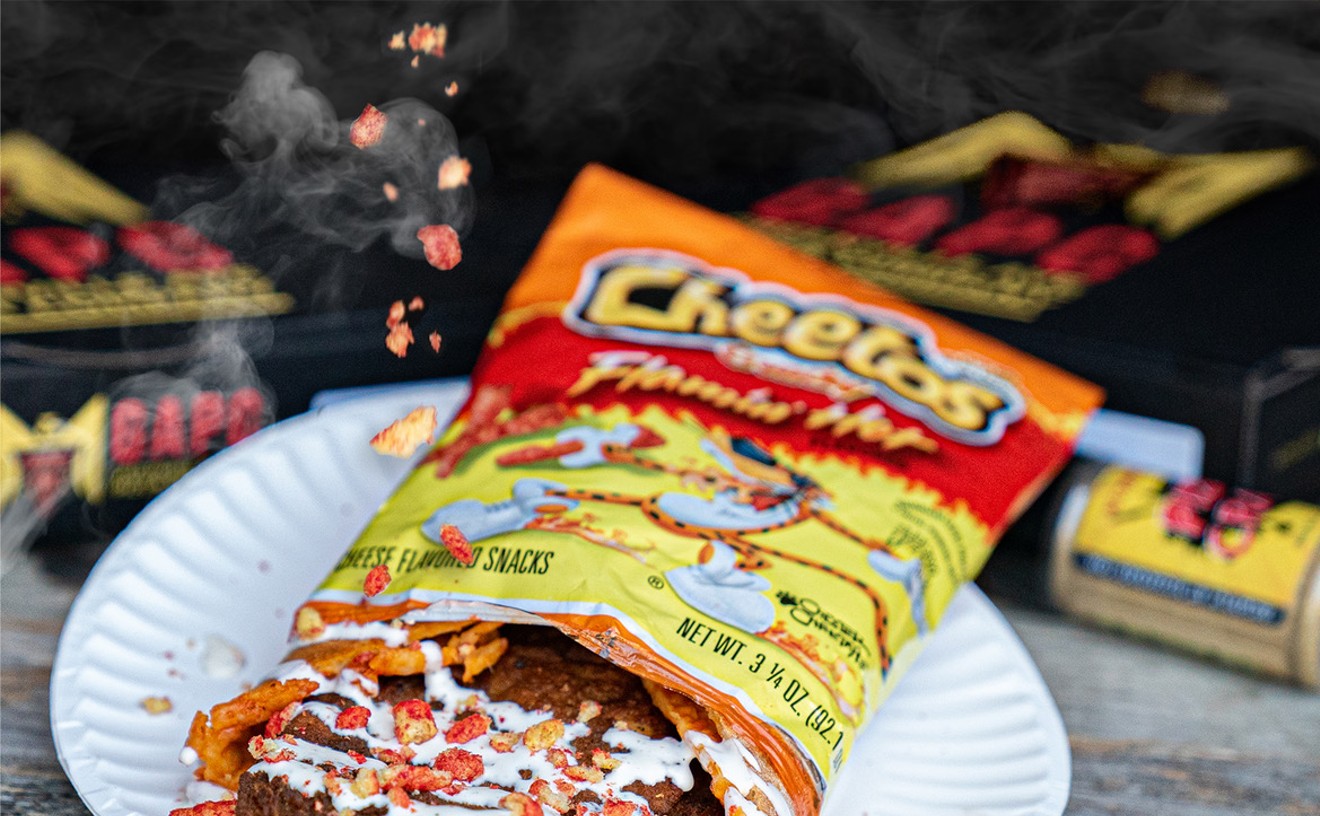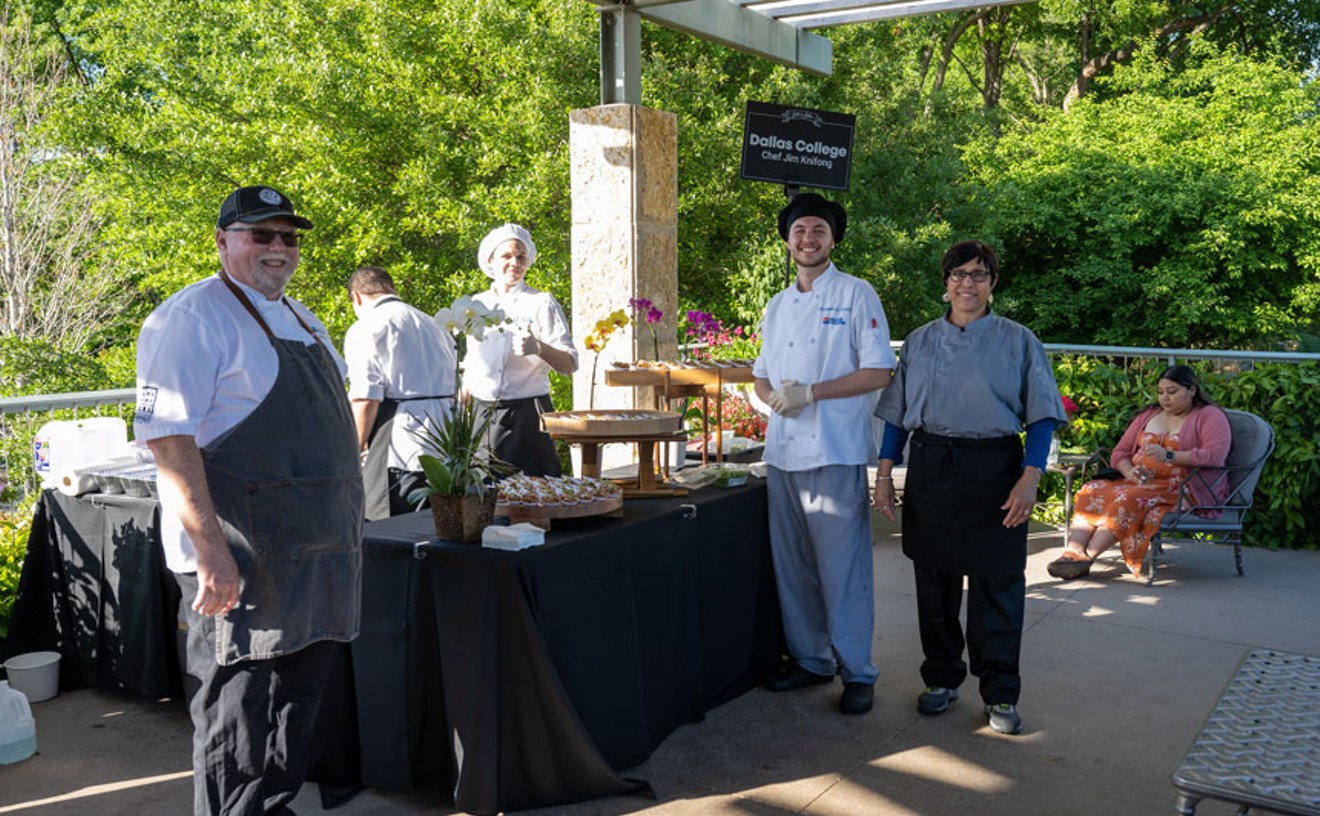That’s not how a handroll bar works. Handrolls (temaki in Japanese), with rice and filling wrapped in a sheet of dried seaweed, are meant to be consumed quickly; between the chef’s hands and our mouths, they should survive for mere seconds. A meal at a handroll bar is almost as fast as ordering takeout, as Dallas diners are finally discovering since two new handroll-focused restaurants opened in late 2018.
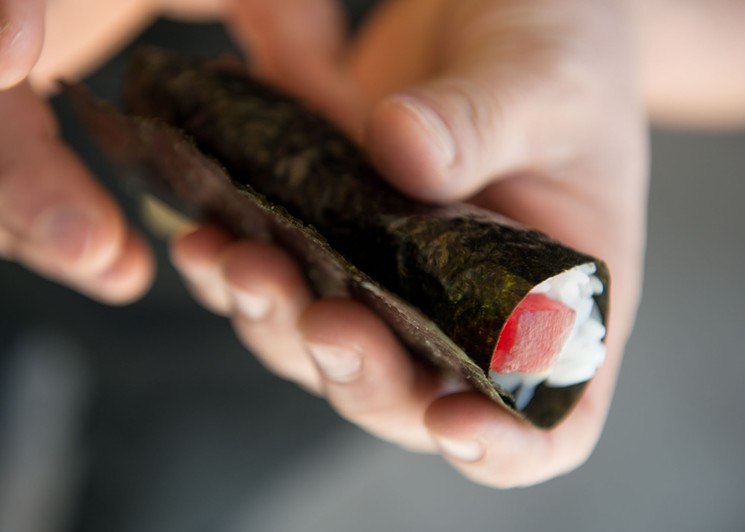
Two new Dallas handroll bars, Nori Handroll Bar and Namo (pictured), are duking it out in Dallas' growing temaki scene.
Alison McLean
Namo, in Uptown, is a tiny, contemplative place with a brief menu of handrolls, sashimi and not much else. Nori, in Deep Ellum, is over-the-top loud, almost constantly busy and blessed with a full kitchen that adds a long slate of cooked Japanese bar snacks and salads to the menu. Which restaurant is the better experience? We tried both to find out.
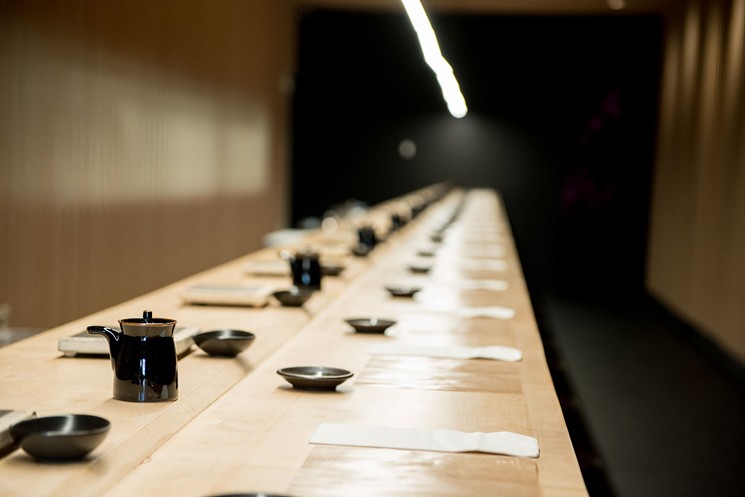
Nori in Deep Ellum offers one seating option: sitting at the bar, watching your handrolls come to life.
Alison McLean
We stopped in at Nori on a frigid Saturday night, discovered a two-hour wait for seats and headed around the corner to BrainDead Brewing for a consolation steak. But on the following Monday, Nori was almost empty; only six customers sat along the narrow bar that runs the full length of the dining space. (Sushi lovers often advise newbies to sit at the bar; at Nori, everybody sits at the bar, always.)
That small crowd, in the restaurant’s tiny space, meant that we basically had a sushi chef to ourselves. After we ordered a “Hungry” set menu of four handrolls for $21, food started arriving quickly: first a roll of rice and cucumber wedge with a dusting of sesame seeds, which mainly serves as notice that Nori’s sushi rice is excellent; then a succession of tuna and yellowtail cuts. Our favorite was the negitoro — fatty tuna belly smashed into a tartare to make it easier to eat, then rolled simply with rice and scallions ($9 a la carte).
Don’t pause to admire or take Instagram photos: The crispy sheet of seaweed that holds the roll together quickly softens, which makes the roll considerably harder to eat. Judging from social media, plenty of Dallasites have made this mistake in order to impress their friends, but the best way to dine at Nori is to watch the chef make the roll, then pick it up and devour immediately.
For a freshwater eel special handroll ($6), the chef dropped a sizable piece of eel into a skillet. But the skillet didn’t rest on a stovetop. Instead, he proceeded to blast the eel with a minute-long close-range assault by blowtorch before packing it into yet another impeccable roll.
We also found much to like on the izakaya menu of Japanese tavern snacks, like the mentaiko bowl, a simple rice bowl topped with dried seaweed strips and a scoop of salty, tangy cod roe ($7). Nori’s are some of the best takoyaki, fried dough balls studded with octopus, in the area: The interior is practically molten, but the outsides retain that satisfying deep-fried crunch (five for $8).
I enjoyed seeing fresh wasabi on offer, too, and dipped my chopsticks in it compulsively between courses ($1). If there’s any flaw to Nori’s smoothly running operation, it’s in customer convenience. Even on that empty Monday night, as the sushi chef passed our rolls to us and told us what they were, we couldn’t actually hear his explanations because Nori’s speakers play music so loudly that conversation is challenging. On a busy night, the noise must be borderline intolerable.
Namo: Just the Handrolls, and Make It Snappy
Eighteen seats line the bar at Namo in Uptown’s West Village development, and each of those bar stools has a slight, surprising rocking motion. Tip forward and inspect the work station, where almost every ingredient for the bar’s handrolls is already prepped for service. Just as Namo’s menu is shorter and simpler than Nori’s, so is the dining experience.
We were in Namo for 30 minutes, but half of that time was spent waiting to get the attention of a bartender who was preoccupied with prepping a to-go order. When we finally managed to order, the meal itself took just seven minutes, as our sushi chef took each sheet of nori out of a tin, added a heaping scoop of rice, topped it with seafood, rolled up the result and handed it directly to us.
Namo smashes almost all of its seafood into a pulp before the customer arrives, so an albacore handroll ($4.25) is basically just seaweed, rice and fish paste. That gloopy texture gets fairly old, fairly quickly, and makes the toro roll ($5) especially nondescript. (At Nori in Deep Ellum, the fish is smashed to order, and has a rougher cut, which adds contrast to each bite.)
Many of Namo’s rolls are simply protein, rice and seaweed without additional seasoning. My favorite offering, because it adds extra flavor to the mix, is the $4.50 yellowtail handroll jazzed up with sesame seeds and finely diced jalapeños.
There’s not much here besides handrolls, but we did like a petite bowl of salmon sashimi topped with a dab of what seemed to be a mixture of fresh wasabi and diced cucumber ($7), and the miso soup is quite nice too ($4). I also liked seeing that the tip is included in the pricing, though I still rounded up my tab. The bill contained another surprise: Although the handrolls are generally more affordable here than at Nori, we’d still spent $35 per person, and I was still hungry. Afterward, I drove to Central Market to gobble down free samples.
So Which Temaki Bar Does It Best?
Oddly, Namo and Nori share two common weaknesses. They both inhibit conversation by cranking the music up far too loudly — though we did overhear two Nori employees talking smack about Namo — and they both refuse to accept cash. The “cash-free” system is meant to be convenient and prevent theft, but research indicates that banning cash restricts a business’s clientele to only those customers financially fortunate enough to have cards. In other words, it’s a way of discriminating against the poor.
Philadelphia’s City Council just passed a ban on cashless stores. If Nori and Namo can’t be persuaded to reconsider their policy, maybe Dallas politicians will do the reconsidering for them.
But the two restaurants offer quite different experiences overall. Namo is nearly fast food; a savvy diner told me that he compares it to Chipotle. I might stop by for a quick snack before seeing a movie at the Magnolia Theatre. Nori, by contrast, is a more complete restaurant experience, and its handrolls offer more texture, more flavor and less rice-heavy filling. Also worth noting for couples: Nori will happily cut a handroll in half for sharing; Namo politely declines to do so.
A late entrant in the temaki sweepstakes, Sushi de Handroll, is expected to open within weeks in a development called The Hill on Walnut Hill Lane (just east of U.S. 75). But Nori has already set the bar high for handroll bars in Dallas. Just remember to avoid that two-hour line by going on a weeknight.
Namo, 3699 McKinney Ave. #305. 214-484-5151, namosushi.com. Open Monday through Thursday 11 a.m.-10 p.m., Friday and Saturday 11 a.m.-11 p.m., Sunday 11 a.m.-9 p.m.
Nori Handroll Bar, 2814 Elm St. 469-436-6674, norihandrollbar.com. Open for lunch Monday through Saturday 11:30 a.m.-2:30 p.m. and for dinner Monday through Thursday 5:30-10:30 p.m. and Friday and Saturday 5:30 p.m.-midnight; closed Sunday



